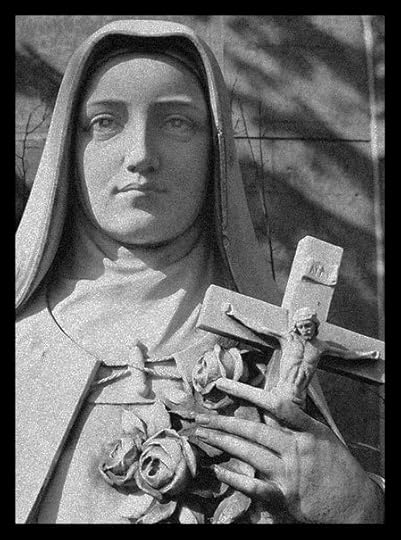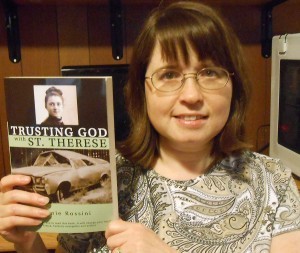Connie Rossini's Blog, page 12
August 29, 2014
Did Teresa of Avila teach Centering Prayer?

St. Teresa’s Transverberation by Josef de Obidos (Wikimedia Commons)
Last winter on social media, I came across another Catholic author who was promoting yoga. Not as an exercise program, but for spiritual growth. I was shocked. I asked her why she wasn’t promoting prayer instead. She answered, “Meditation is prayer!”
Nope.
Two months ago, my brother forwarded an email from a colleague, asking about Centering Prayer. A friend was pushing it relentlessly. I looked at the website of the Catholic group that promotes Centering Prayer and found this in the FAQs:
This form of prayer was first practiced and taught by the Desert Fathers of Egypt … the Carmelites St. Teresa of Avila, St. John of the Cross and St. Therese of Lisieux…
Nonsense.
The other day a new reader asked in the comments about meditating on Sacred Scripture. “Is this the same as the method of Fr. John Main, who has adapted an Eastern mantra method for Christian meditation?”
Uh-uh.
August 26, 2014
3 resolutions for a more contemplative school year

Prayer Before the Harvest by Felix de Vigne (Wikimedia Commons).
Now that my book blog tour is done, I finally have time to start thinking about the new school year. Yes, I know many of you have had kids in school (or studying at home) for a couple weeks now. We always take August and the first week of September as our summer vacation. This is the time when I’m overwhelmed with garden vegetables to harvest and cook.
Here are three resolutions that families can make, no matter what their schooling method.
1. Pray moreResolve to take the next step in your prayer life, and encourage your kids to do the same. For little ones, this could mean learning to make the Sign of the Cross more perfectly. As a family, you could begin saying a morning prayer together. We like tgis one from Catholic Children’s Treasure Box:
Dear God, now that I start the day, I offer you my heart and pray, guide me in everything I do, and keep me always close to you. Amen.
Adults, this is a perfect time to Contemplative Homeschool.
August 22, 2014
St. Therese’s daring teaching on Purgatory

Statue of St. Therese at Holy Hill in Wisconsin (photo from Wikimedia Commons, altered by Connie Rossini).
Before we discuss St. Therese of Lisieux’s teaching on Purgatory, I want to put that teaching into context. Her teaching is daring. Some of the nuns she lived with in the Carmelite monastery were scandalized by it, thinking it presumptuous. The last thing St. Therese (or I) would want is for people to interpret her teaching in such a way that they thought they could be spiritually lax and still go straight to Heaven.
So, As you read about her teaching, keep these things in mind:
Therese is a doctor of the Church. The Church has only 35 doctors, four of them women. Now, being a doctor of the Church doesn’t mean she was infallible. But it does mean that the Church especially recommends her spirituality for Christians in any age. Therese is the Doctor of the Little Way of Spiritual Childhood, and her teaching on Purgatory was part of that Little Way.St. Therese was completely orthodox. This follows from #1. What she taught about Purgatory must never be taken to contradict official Church teaching on the subject.Presumption is a sin. And if we presume that God will forgive our mortal sins without true repentance and a visit to the Sacrament of Reconciliation, that presumption is a mortal sin.Can we avoid Purgatory?So, what did St. Therese say about Purgatory?
When she was assistant novice mistress, she began teaching the novices under her that they could avoid Purgatory. What was so daring about this? None of the novices was especially holy! All of them were average Catholic women, with natural weaknesses. They had very few meritorious acts to balance the weight of their sins. Some of them even had personality problems. Therese taught them they could go straight to Heaven when they died.
How?
Simple. By trusting God for everything.
An antidote to JansenismTherese grew up in a France that was still greatly influenced by Contemplative Homeschool.
August 19, 2014
The Devil wants to lock you in fear and doubt

St. Michael and the Devil by Poulakis Theodoris (Wikimedia Commons).
Dear readers, how is your spiritual life? Is your heart at peace? Do you have a deep, abiding joy? Is your faith stronger than ever? Is your prayer flourishing?
Or is your heart full of anxiety? Do you fear for the future of your loved ones? Do you doubt God’s goodness? Are you on the brink of despair over your sins?
God does not want you to live a life of fear, doubt, or frustration. But the Devil does.
Lately I have felt like the Devil is trying to stop me from spreading St. Therese’s vision of trust and love. He doesn’t want people to surrender their lives to God. He knows what will follow–lives drastically changed.
Two weeks ago I held a Google+ Hangout with some special readers. We had technical problems, but that was normal. The technology was new to all of us, and I am not especially savvy at these things.
Then my book blog tour for Trusting God with St. Therese began. One blogger had difficulty posting my slide show. Okay, these things happen. But here’s how the rest of the tour went:
On four blogs my comments, and sometimes others’, disappeared.I had the wrong blog address for another day.One woman’s server was down the morning of her post. I was able to access it after a few hours, but readers told me they couldn’t do so until the next day.Another post went up very late.Only the last day’s post went up without a hitch.Besides that, one fellow blogger had to bow out of the tour because of severe anxiety. Another had a fire on her farm after the tour. Thankfully, no one was hurt, although damage was serious. A third is facing a financial crisis. And last night a scheduled Skype interview for another blog had to be cancelled because we couldn’t get the recording apparatus to work.
Now, all these things could be coincidences. Some of them probably have nothing to do with my book. But it’s a few too many coincidences for me to think the Devil is not involved. It reminds me of when I wrote my recent post on Contemplative Homeschool.
August 15, 2014
The Assumption of Mary shows us our destiny

Assumption of the Virgin by Guercino (Wikimedia Commons)
As a member of the Secular Order of Discalced Carmelites (OCDS), I chose the name Mary Francis of the Divine Mercy for use in Carmelite circles. The Assumption was one of my feast days. I fasted on the vigil and celebrated doubly on the 15th. I have felt somewhat disconnected from this tradition since leaving Carmel three years ago. This year, I made sure to fast again. I want to feel a closer companionship with the Blessed Virgin as I strive to live a contemplative life.
Mary’s Assumption teaches us that our destiny is outside this world. Like her, we will all (if we end our lives in a state of grace) dwell bodily with God in Heaven following the Last Judgment. We need not fear death or annihilation. Instead, we must entrust ourselves totally to God as she did. Her fiat (“Let it be done unto me…”) is fulfilled in her Assumption.
My book blog tour wraps up today with an Contemplative Homeschool.
August 12, 2014
The Kingdom of God is Within You

God the Father on a Throne, with the Virgin Mary and Jesus (anonymous 15th century painter, Wikimedia Commons).
If you missed my post that went up at SpiritualDirection.com on Saturday, here it is. For the rest of you, don’t forget to visit www.callherhappy.com today, where I have a short guest post on Purgatory for my book blog tour. Here is the beginning of the SpiritualDirection.con post:
The other day I was feeling disgusted at the depravity of our culture. I am an idealist. I would like the world to be perfect, a place where everyone is striving to follow God. Or if I can’t have that, I’d settle for a world that tolerates people who are striving to follow God and does nothing to hinder their spiritual growth. As we all know, that’s not the world we live in. The “real” world is a fallen world, a world tainted by sin. I don’t like it.
I’m especially bothered when I see the world presenting my children with enticements to sin, or making it hard for them to live for Christ. I don’t remember what happened the other day that tempted me towards despair, but I felt depressed and beaten down when I went to prayer.
But I went to prayer! And I find that if I am truly open in prayer, my fears and frustrations tend to melt away in God’s presence.
This particular day, I was telling God that I wished we were still in the Garden of Eden. I wished we could live in a perfect world, walking with God in the cool of the day. Then the Holy Spirit nudged me. He reminded me that we can.
One day some Pharisees asked Jesus when the kingdom of God would come. He told them that it was already here. “The kingdom of God is within you” (Luke 17:21).
Read more: http://spiritualdirection.com/blog/2014/08/09/kingdom-of-god-within-you#ixzz3ABEFEXWqOther posts you may likeContemplative Homeschool.
August 8, 2014
How to suffer like a Christian
Suffering. Ever since the Fall of Adam, it’s an unavoidable part of life. We suffer daily in little ways. The alarm clock rings too early. We spill coffee all over our work clothes. The kids are disobedient. We get stuck in traffic. These little things are a reminder that all is not right with the world. Something is out of whack. We have lost the close connection with God we were meant to have.
When we face small trials, we have an opportunity to grow in trust and love. We can offer our disappointments and dislikes to God in love, asking Him to use them to bring others to Him. We can say, “Jesus, I trust in you,” praying that He helps us to accept His sovereignty over our day. Because after all, we were never meant to be in charge of our life. These gentle reminders of that fact can help us reorient ourselves towards God. (As an aside, I am experiencing a little annoyance right now from my kids. Thank you, Lord, for this opportunity to put into practice what I am preaching!)
What about tragedies?Every day on FaceBook, someone asks me for prayers. Sometimes, a loved one is seriously ill. Other times, a FaceBook friend faces clinical depression. Prayers for difficult pregnancies and comfort while burying infants or dealing with miscarriage are common.
How should a Christian face tragic suffering?
Sometimes we have the idea that being a Christian means being a stoic. We try to act like everything is okay. We think that sorrow itself is ungodly. We think an aversion to suffering shows a lack of trust.
Here is a quote about St. Therese from my book:
Therese was not afraid to be weak, even in her sorrow. She saw no shame in admitting that she was grieving and suffering. ‘Therese reread what Father Pichon had taught during the retreat [before Marie's profession] in 1887. To suffer according to the heart of God, one need not suffer with courage like a hero. It is enough to suffer as Jesus did at Gethsemane’ (Therese and Lisieux, Pierre Descouvement, 148).
How did Jesus suffer in Gethsemane? He sweated blood. He repeatedly begged God to remove His suffering. He asked for others to be near Him and pray. And He said, “Not my will, but yours be done.”
We can’t escape suffering. Although it is natural to desire to, because man was created for joy, not grief, running away from suffering is running away from the Cross of Christ.
So, go ahead and cry. Pray your heart out. Ask others to pray with you. Beg God to help you. Don’t wallow in your suffering, making it, rather than God, the focus of your life. But don’t worry about being a hero. Your life is difficult enough already.
Pray, “Your will be done.” Accept your suffering, if God does not remove it. Accept the death of someone or something that you loved. And cling to true hope of resurrection.
Connie Rossini
Note: My book blog tour is taking a little break today, as one of the other bloggers who was going to write about my book is experiencing suffering. Please say a prayer for her. And if you haven’e seen it yet, Contemplative Homeschool.
August 5, 2014
Blog tour schedule for Trusting God with St. Therese
My book blog tour begins tomorrow! What is a book blog tour? It’s the digital-age substitute for an author’s traveling around the country doing book signings. Most book signings cost the author more in travel and other expenses than he takes in through sales. Of course, meeting readers in person is a great benefit I don’t want to pass up. So I hope to do some traditional book appearances as well.
But for the next two weeks, I will be traveling to the online homes of fellow Catholic bloggers who have agreed to help me share my book with more readers. See the schedule below to follow along for interviews. reviews, a slideshow, an excerpt, and a giveaway. The person with the best comment on a host blog during the tour will have a Mass said for his intentions by my brother, Fr. Michael Mary, M. Carm.
Don’t forget! The Google+ Hangout Launch Party is tonight! If I have already sent you an email invitation, please respond to it now so you don’t miss out. If you bought the book but have not yet been invited, you must email me your purchase order number by noon Central Time today, with the subject line Hangout.” My email is crossini4774 at comcast dot net. This is a one-of-a kind, live video question and answer session. Don’t worry if you’ve never attended a Hangout before or if you don’t have a Google account.
Now, here’s the schedule. I will add links as each post goes up:
Wednesday, August 6 The Breadbox Letters with host Nancy Shuman
Thursday, August 7 Quicksilver to Gold with K. Ann Seeton
Friday, August 8 My scheduled host for today had to take a raincheck. I hope to have a new post on SpiritualDirection.com to share with you.
Saturday, August 9 Written By the Finger of God with Anabelle Hazard
Sunday, August 10 Jacqueline Vick, Author blog
Monday, August 11 Catholic Fire with Jean Heimann. A giveaway is only one of the things Jean has planned for this post!
Tuesday, August 12 Call Her Happy with Jenna Hines
Wednesday, August 13 Hoi Kai Paulos with Joe Wetterling
Thursday, August 14 Prayer Gardens with Margaret Rose Realy
Friday, August 15 Will Write for Tomato Pie with Erin McCole Cupp
Can I count on your help?Already readers are telling me how much Trusting God with St. Therese is helping them grow closer to Christ. Contemplative Homeschool.
August 1, 2014
Does God work for good in our sins?

Return of the Prodigal Son by Guercino (Wikimedia Commons).
The second reading from Sunday’s Mass included a favorite verse of mine, Romans 8:28:
We know that in everything God works for good with those who love him, who are called according to his purpose.
The newly ordained priest who said Mass at Holy Trinity Cathedral preached that God works for good even in our sins. Do you believe this? I do, firmly! So did St. Therese of Lisieux.
Today I’d like to examine St. Paul’s teaching on this subject, and what it means for our spiritual lives.
What can separate us from God?St. Paul writes:
For I am sure that neither death, nor life, nor angels, nor principalities, nor things present, nor things to come, nor powers, nor height, nor depth, nor anything else in all creation, will be able to separate us from the love of God in Christ Jesus our Lord. (Romans 8:38-39)
I have heard Catholic apologists preach on this passage, noting that Paul did not include “sin” in his list. Sin, they argue, can separate us from God, so that’s why Paul did not mention it here. They are trying to keep people from being presumptuous, from thinking that they could sin as often and as badly as they wanted and still go to Heaven.
The Church’s teaching about mortal sin and true hope is worthy of defense. Nevertheless, I believe, after some reflection on Therese’s little way, that Paul was including sin here. After all, he said “nor anything else”–doesn’t that include sin? Paul was not known to be imprecise. He said what he meant. He did not mince words. If he meant “everything except sin,” surely he would have said so!
Now, Paul would never condone taking sin lightly. He says,
What shall we say then? Are we to continue in sin that grace may abound? By no means! How can we who died to sin still live in it? (Romans 6:1-2)
Those words leave no room for presumption. But he wrote them to balance out these words, which he had written just previously:
Where sin increased, grace abounded all the more. (Romans 5:20)
Let’s step away from Paul’s writing for a moment and reflect on his life. Paul had been a strict follower of the Law of Moses. He was so zealous for the Law, he says, it lead him to persecute the Church (Philippians 3:6). He sinned miserably, standing as witness at St. Stephen’s death, dragging Christians to prison. He multiplied sin after sin–sins that, objectively speaking, were mortal.
But, he says, he acted in ignorance. Therefore, God had mercy on him (1 Timothy 1:13). In fact, Jesus appeared to him on the road to Damascus, temporarily blinding him. After Paul’s baptism, Jesus spoke to him again, teaching him the Gospel and making him an apostle.
Not every sin is mortalWhat can we learn from Paul’s life? Sometimes we might commit objectively mortal sins with the best intentions. When we act in ignorance, truly striving to follow God, we do not separate ourselves from Him, even when we do serious wrong. Our sins cannot separate us from God if we are truly ignorant that they are serious sins. When Paul persecuted the Church, thinking he was pleasing God, Jesus stepped in to enlighten him.
This is the first way in which sin fails to separate us from God.
We also know from the teaching of the Church that less serious sins do not separate us from God. They may temporarily keep us from growing closer to Him, but they do not place us outside the life of grace. If they did, even the saints would be in trouble, for many of them acknowledge that they still committed sins of weakness until the end of their lives.
What about mortal sin?What if we knowingly, willingly commit mortal sin? Well, that’s a serious problem. St. Paul writes
If you live according to the flesh, you will die. (Romans 8:12)
So, how do we interpret this in light of the other passages we have studied? First, Paul does not seem to consider the idea that we could commit serious sin after we come to Christ. He assumes that we are either for God or against Him, in the Spirit or in the flesh. A later generation of Christians would consider the state of people who fall after baptism.
But Jesus knew this would be an issue. He told us that there is only one unforgivable sin–blasphemy against the Holy Spirit. The Church interprets this as a refusal to submit to the Spirit’s promptings to repent.
The key for us when we have committed mortal sin is repentance. Everyone who is still physically alive still has a chance to be united with Christ. Our sins can only separate us from God if we hang on to them. They can’t keep us away from God unless we will them to by our stubbornness.
What this means for usLet’s return to Romans 8:28. Paul says that “everything” works for our good–if we love God. If we submit to God’s authority, including confessing our sins in the Sacrament of Reconciliation, they work for our good. They teach us about the great mercy of God. They teach us to rely on Him, not our strength.
When we go around thinking about how badly we have failed God, thinking that we can never be holy now, because we missed Mass on Sunday, or embezzled money from the company, or lied under oath, or publicly denied Christ–or any other sin–we stand in the way of God’s plan. We fail to let Him work for good through our sins.
When we sin–venially or mortally–our first act should be to turn our eyes to God. We lay our sin before Him, but focus on His goodness, not our sinfulness. Once we have done this (including sacramental confession when necessary), we can ask God to work good through our sin.
We can ask Him to help us follow Him more carefully after our sin than we did before it. We can believe that our sin, now forgiven, cannot keep us from sanctity. We can believe that it will even help us reach sanctity.
Do we believe that God can work for our good through our sins? Or do we believe our sins are more powerful than God?
Connie Rossini
Note: I know many of you have bought Contemplative Homeschool.
July 29, 2014
You’re invited to my book launch party!

Join me for a live book launch on Google+ Hangouts next Tuesday!
Wednesday, August 6, marks the official launch of Trusting God with St. Therese" width="150" height="150" />Contemplative Homeschool.





